What Is a Rottie Poo?
Most of us are self-proclaimed dog people, but we prefer certain breeds over others. Maybe we love intelligent dogs more than cuddly dogs, or vice versa. For many people, hypoallergenic breeds are essential.
Many crossbred dogs combine the desirable traits of two breeds. For example, Rottie Poos are beautiful mixed dogs with the strength of Rottweilers and the elegant coats of Poodles.

Below, we will discuss the specifics of this breed. For those considering adopting or purchasing a Rottie Poo, you will find all the information they need to make the right decision.
History
The first report of Rottie Poo puppies originated in Germany in the 1980s. The first Rottie Poos may have been born earlier, but no other known claims exist.
Although the Rottie Poo is a relatively new dog breed, its ancestors have rich histories.
Rottweilers
Legions of the Roman Empire required a steady supply of food while in battle, so they traveled with cattle. They brought Rottweilers to guard their cattle, but these Rottweilers were left without a home after the empire fell.
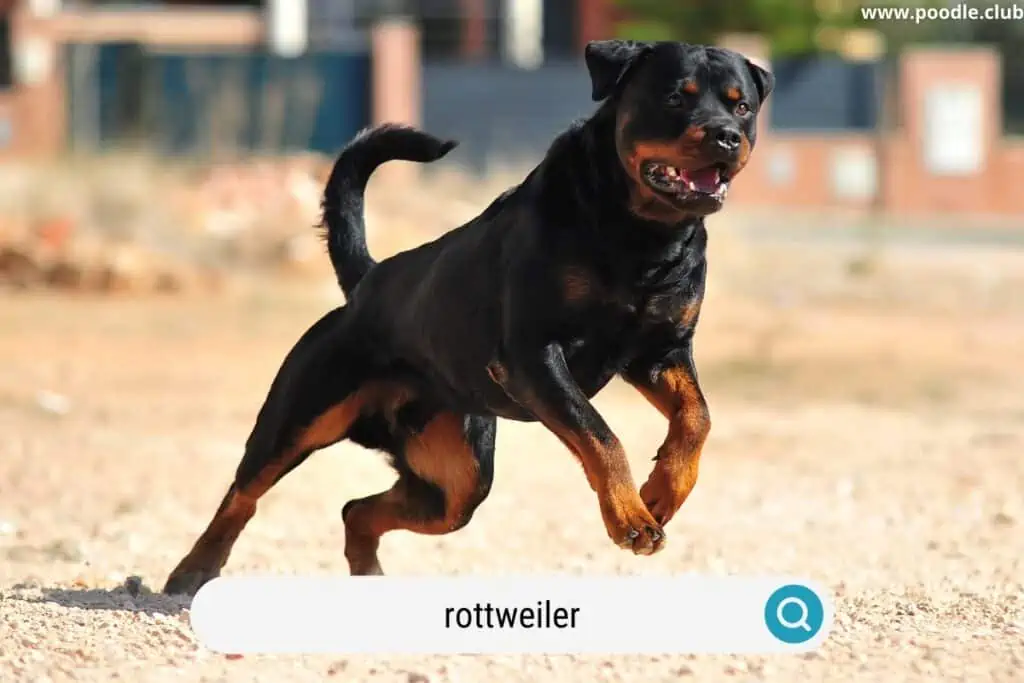
Townspeople in Rottweil, Germany, took the guard dogs in as cattle herders. As time went on, Rottweilers were trained as police dogs, search-and-rescue dogs, and guide dogs for blind people.
PuppySpot is a reputable dog marketplace where you can browse and find compatible puppies right from the comfort of your home. They have placed over 200,000 puppies into homes in the US!
Poodles
Poodles have not been bred nearly as long as Rottweilers. They originated in Germany before the 15 century, where they were primarily duck hunters.

When Poodles hunted waterfowl, they were known for splashing around in the water. Thus, the word poodle was derived from the German word “pudelin,” which means splashing in the water.
Their famous haircuts allowed the Poodles to swim more smoothly and keep their organs and joints warm in cold water.
Later, French nobles adopted the breed, and they are the national dog of France to this day.
Genetics
Although all Rottie Poos are crosses between Poodles and Rottweilers, the percentage of each breed will vary. Many breeders will describe their puppies using the terms below. Here is your cheat sheet to what they mean.

The letter F indicates that a dog is crossbred. The number following the F indicates the dog’s generation. A ‘B’ after the number means that the dog was backcrossed.
Backcrossing involves inbreeding back to a purebred dog.
F1 and F2 Rottie Poos are 50% Poodle and 50% Rottweiler.
All other generations of Rottie Poos contain more poodle genes than Rottweiler genes. This type of breeding aims to produce puppies that shed as little as possible.
- F1B Rottie Poos are 75% Poodle and 25% Rottweiler
- F1BB Rottie Poos are 87.5% Poodle and exactly 12.5% Rottweiler
- F2B Rottie Poos are 62.5% Poodle and 37.5% Rottweiler
- F2BB Rottie Poos are 81.25% Poodle and exactly 18.75% Rottweiler
Temperament
Rottie Poos have a reputation for having desirable traits all around. The breed is very intelligent and daily easy to train. They are energetic, confident, and hardworking, and owners enjoy testing their skill and athleticism with fun obstacle courses.
However, Rottie Poos are not built for work alone. They are playful and silly, and they have cheerful demeanors.
Despite their high energy levels, Rottie Poos can be very cuddly when it is time to calm down. Some will even try to be lap dogs.
Rottie Poos are very alert, so it can take a while before they warm up to strangers. Their loyalty to their owners can lead to aggression if they are not appropriately trained.
Although most Rottie Poos do not have separation anxiety, they do not like to be left alone.
Appearance
The size of Rottie Poos varies greatly. Most adults weigh between 50 and 100 pounds and grow to be 15 to 27 inches tall.

Rottie Poos’ coats can also differ in appearance depending on their genes. Most mixed puppies have wavy or curly fur. Their fur can be medium or long and is usually very dense.
Some have an undercoat, while others do not.
Their coats can be any of the following colors:
- White
- Cream
- Pied
- Blue
- Red
- Black
- Brown
- Gray
How to Care for a Rottie Poo?
Without a doubt, Rottie Poos are great companions. Continue reading to decide whether you are ready to care for these beautiful dogs.
Grooming
You will need to brush your Rottie Poo at least two to three times a week, but it is best to do so daily if he has long fur. You will probably need to brush him twice a day during shedding season. Use a pin brush and a comb to remove tangles without hurting your dog.
Rottie Poos’ coats can quickly become unruly. You can clip your dog’s fur at home regularly or send him in for professional grooming every four to six weeks.
Every couple of weeks, bathe your dog. You can do so at home or send him to a groomer. Certain shampoos can irritate your dog’s skin, so stick to mild dog shampoos.
Tips for Grooming Dogs
Grooming a dog at home may seem like a daunting task. If you want to save money on a groomer, follow these tips for streamlining the process yourself.
- Prepare all of the materials before bringing your dog to the bath.
- You may want to bring treats.
- Comb your dog before bathing to remove potentially painful tangles.
- Reward your dog when he is calm.
- Give your dog a break if he is too restless or agitated.
Diet
Rottie Poos are large dogs with a great deal of energy and require nutrient-rich food. Focus on top-quality, low-fat food as these dogs are prone to digestive tract issues.
Unfortunately, Rottie Poos gain weight quickly. Avoid food with too much filler as it can leave your dog feeling hungry unless he over-eats. Instead, feed your dog two or three smaller meals daily because free-feeding often leads to weight gain.
Exercise
Both Poodles and Rottweilers are athletic breeds, so Rottie Poos are very energetic. In addition, they are both agile and strong, which makes your exercise options nearly limitless.
Your Rottie Poo should average at least one hour of exercise every day. This routine not only allows him to maintain a healthy weight but it promotes a healthy mind, too.
Owners who perform physically-intensive work can bring their Rottie Poo along for assistance throughout the day. These dogs are intelligent and strong enough to keep up with most blue-collar work.
Rottie Poos enjoy a variety of other activities, including:
- Walking
- Hiking
- Swimming
- Fetch
- Agility practice
- Tracking practice
Health
Luckily, Rottie Poos are less likely to develop genetic health issues because they are crossbred rather than purebred. They are still prone to certain health conditions, however.

Hip dysplasia often affects both Poodles and Rottweilers, putting Rottie Poos at a higher risk for this condition. Hip dysplasia occurs when the hip is weak or deteriorated. Consult your vet if you see your Rottie Poo limping or bunny hopping.
Cancer is also common among Rottie Poos. Watch out for lymphosarcoma and osteosarcoma, as these are the most common types of cancer for Rottweilers.
Like Poodles, Rottie Poos are prone to a dislocated knee, otherwise known as patellar luxation. Most dogs with this condition walk normally most of the time. However, if your dog begins to walk strangely and one foot turns inward, he may have a dislocated knee.
Bloating is relatively common in Poodles, Rottweilers, and Rottie Poos. When gas builds up quickly, you will see distension of the stomach. Your Rottie Poo’s stomach may twist in response, which blocks blood from entering his stomach and can lead to death if not caught quickly.
You may notice symptoms such as a hard and enlarged stomach, pacing and panting, more drooling than usual, restlessness, dry vomiting, and sudden agony.
FAQs
Below is some additional information for those considering a Rottie Poo.
How do I train a Rottie Poo?
Rottie Poos are relatively easy to train, but they are stubborn from time to time. They need consistency to learn efficiently.
Socialization should play a significant role when you train your Rottie Poo. Your dog should interact with young children, strangers, other dogs, and other animals. These interactions should span multiple environments, which will reduce the likelihood of aggression later in life.
Are Rottie Poos good with children?
If properly socialized, Rottie Poos can be great with children. However, children should not roughhouse with Rottie Poos without adult supervision, which can occasionally trigger aggression.
What is the average lifespan of a Rottie Poo?
Most Rottie Poos live to be eight to twelve years old. Proper exercise and diet can promote your dog’s long, healthy life.
Are Rottie Poos hypoallergenic?
Rottie Poos have hypoallergenic coats. However, breeding can be unpredictable, so certain Rottie Poos will shed and cause allergic reactions.
Additionally, the allergen is in dander and saliva, so even dogs that do not shed can trigger allergic reactions.
Final Thoughts
Although the Rottie Poo is a relatively new dog breed, these dogs have developed excellent reputations.
Their hardworking, energetic nature is adored by those who love to have a companion at work or while exercising. Rottie Poos are also loyal, cheerful, and playful, making them great family dogs.
Before purchasing a Rottie Poo, potential owners must be prepared for intensive training and regular grooming. Luckily, owners who have the time to care for their Rottie Poos correctly enjoy their companionship for many years.
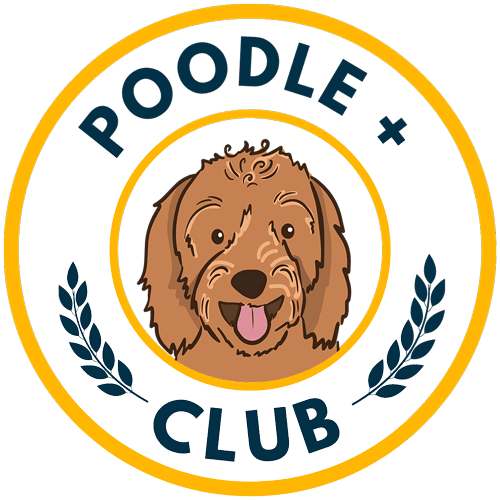

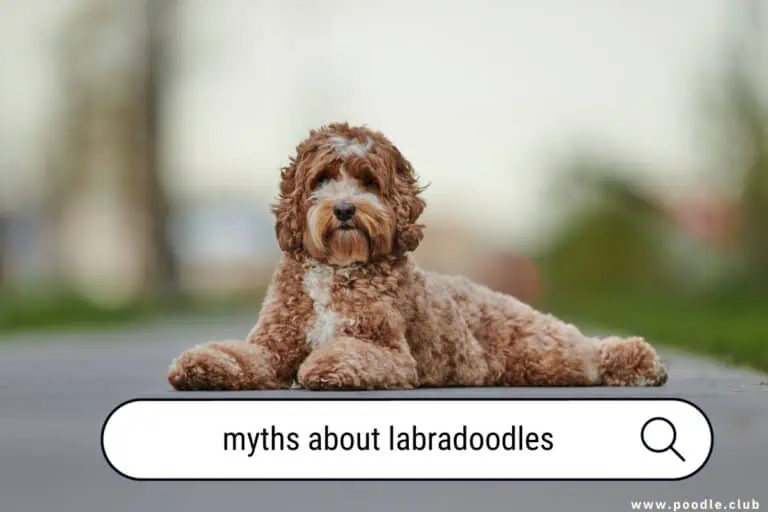
![Are Poodles Mean? [Debunked]](https://poodle.club/wp-content/uploads/2023/05/are-poodles-mean-768x512.webp)
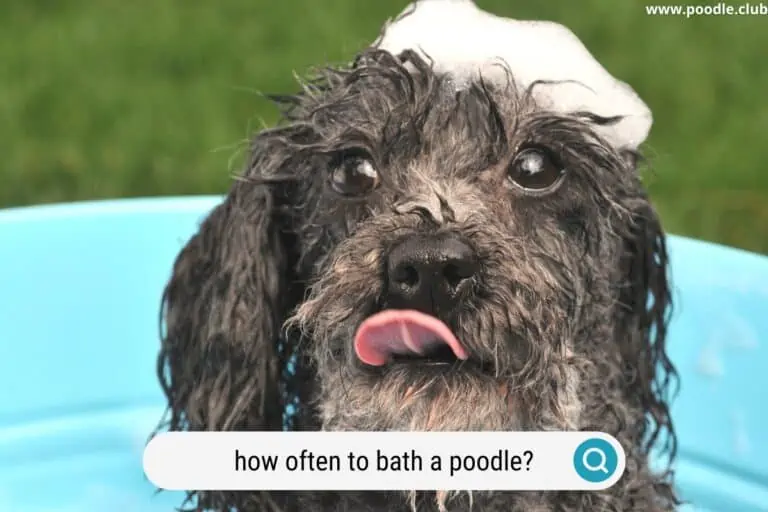
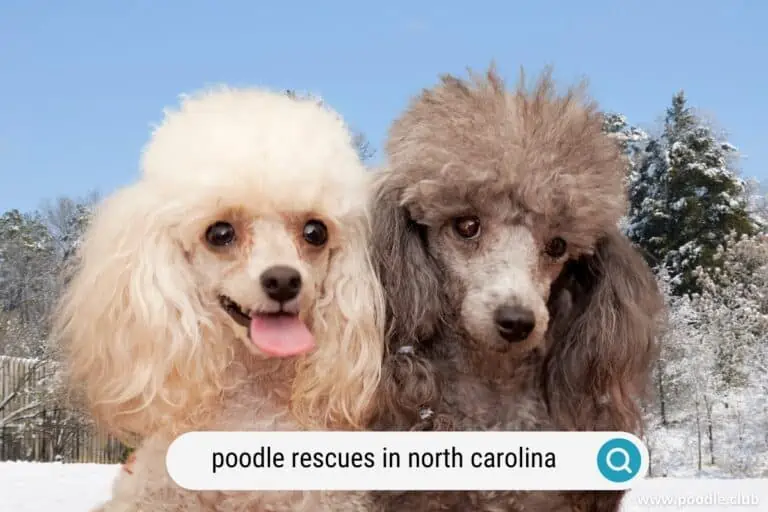
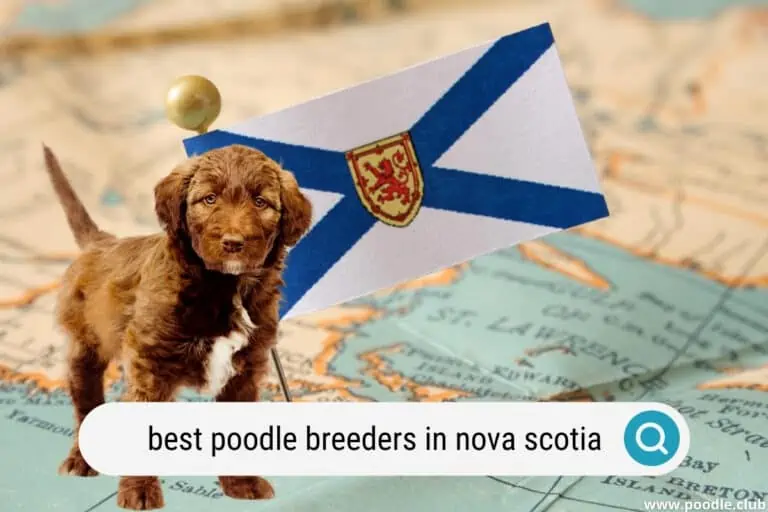
![Do Black Poodles Fade? [How To Fix?]](https://poodle.club/wp-content/uploads/2022/05/do-black-poodles-fade-768x512.webp)